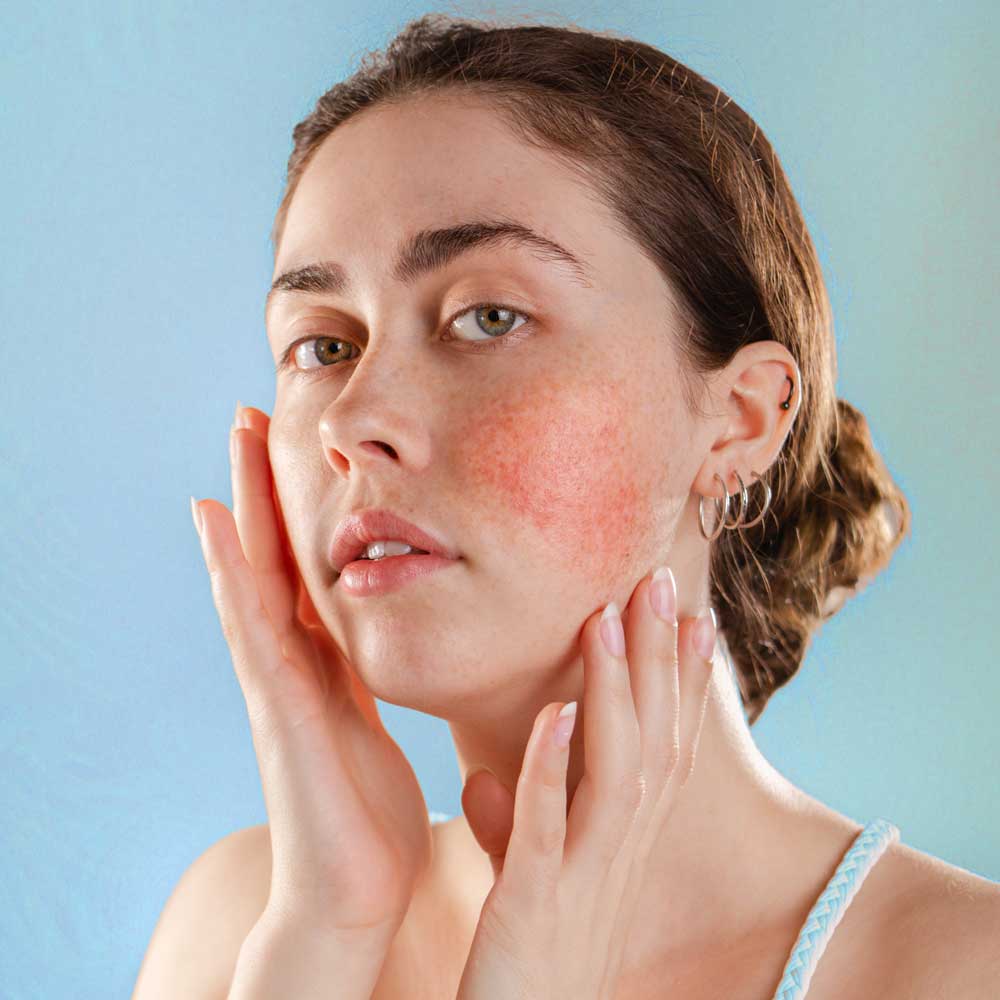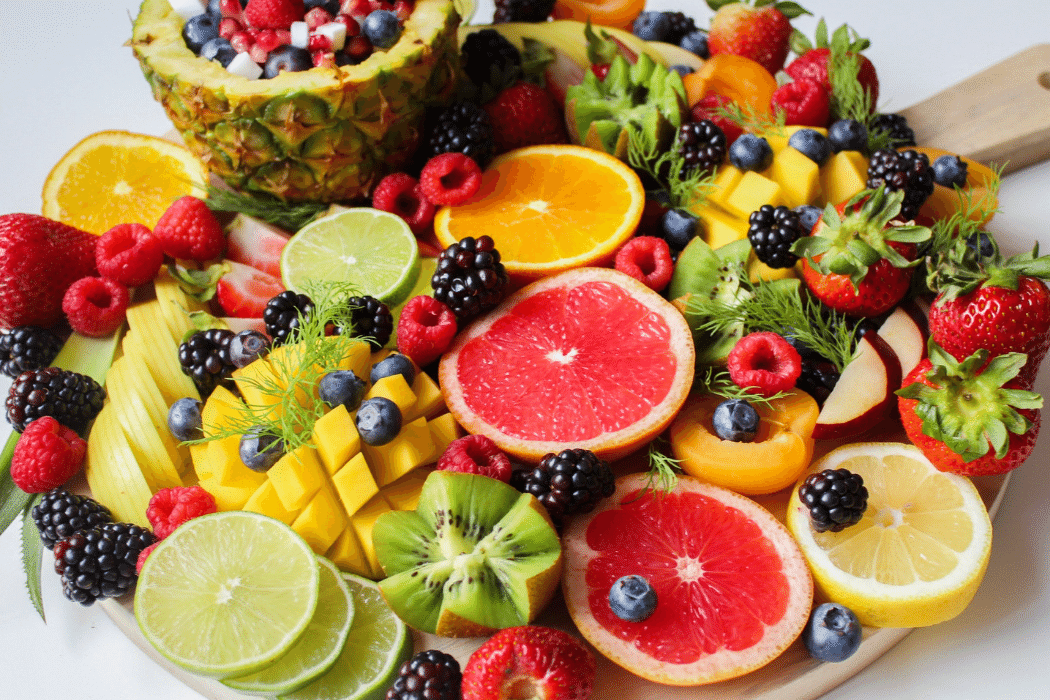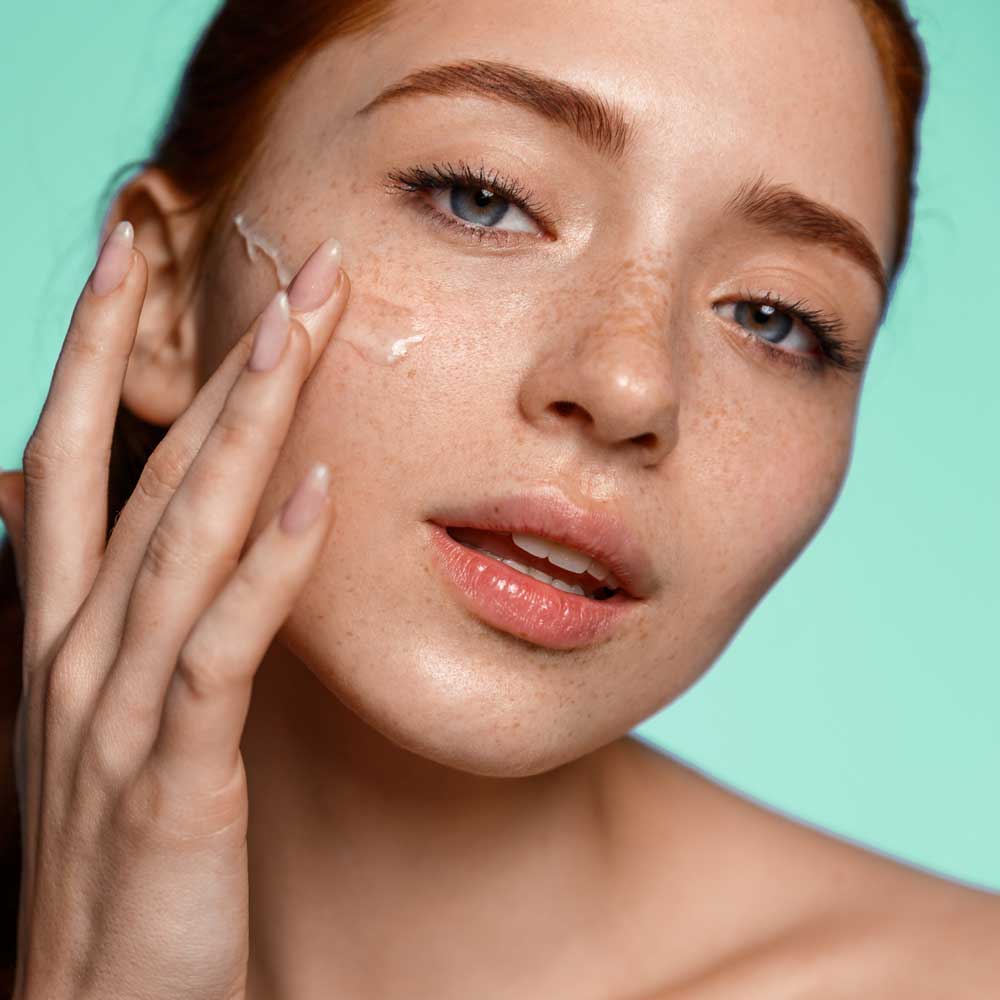How does what I eat affect my skin?
While a solid skin care routine is a great start, it’s not the only approach to healthy skin.
It can be easy to forget about other key factors that influence the skin such as lifestyle, diet and stress. When these elements are all being considered, your skincare will be much more effective as you are working with your body to maximise its health and vitality.
Indeed, our external skin health is a direct reflection of the nutrients we put into our skin as these help to support the skin’s process of renewing older cells and keep the skin bright and supple.
What is the link between diet and skin health?
Researchers back as early as the 1930s suspected a link between skin problems and poor digestion, and modern research has now confirmed the importance of this. Recent research shows that Small Intestine Bacterial Overgrowth (SIBO) is ten times more likely in people with rosacea than those with healthy skin and when the SIBO was resolved it led to a significant improvement in the rosacea.
What foods are good for glowing skin?
Not all nutritional advice works for everyone as we are all unique, and our bodies react differently to specific foods. Learning which foods are best for your body is a process of trial and error, but we’ll take you through some great ingredients to consider alongside a balanced diet.
Rather than cutting out foods, why not ADD those that are packed with micronutrients such as calcium, magnesium, vitamin B12 and folate. The older we get, the harder it is to absorb nutrients so it is crucial to include as many nutrient dense foods as possible. This will also naturally even out your appetite as the body will not be craving as many nutrients.
Here are the top 10 ingredients that are great for your skin health:
1.WATERCRESS
- This is full of as many as 17 nutrients that are fantastic for your overall health, including: potassium, fiber, protein, calcium, iron, thiamin, riboflavin, niacin, folate, zinc, and vitamins A, B6, B12, C, D, E, and K.
- These can help prevent the breakdown of collagen and elastin which leads to plumper looking skin and reduces the appearance of wrinkles.
- This is actually healthier for you than spinach as it’s nutrients absorb better into the lower intestine. Kale is packed with micronutrients which have been shown to fight against cancer such as vitamin A, C, K1, B6, potassium, calcium, magnesium, copper and manganese.
- Kale is a great source of fibre and it helps us to delay the breakdown of simple sugars in our digestive system which increases our blood sugar control.
- Spikes in our blood sugar produce the stress hormone cortisol which can trigger more breakouts. Regulating our blood sugar leads to healthier skin and less sudden blemishes.
- Garlic helps to lower blood pressure and reduce the risk of heart disease as it contains vitamins C, B1 and B6, calcium, potassium, copper, manganese and selenium as well as beneficial sulfur compounds such as allicin.
- It also protects against bacterial and fungal infections, improves blood flow and reduces inflammation.
- Another function of allicin is that it fights the bacteria causing acne.
- Potatoes contain almost every nutrient you need such as potassium, magnesium, iron, copper and manganese. They also contain vitamin C and most B vitamins.
- They have been known to have great brightening properties for the skin, fight against ageing and help the skin look healthier by increasing its water retention.
- These juicy berries are one of the best fruits for you as they contain powerful antioxidants, which are great for brain function and skin health. Blueberries contain anthocyanin which stimulates collagen production and helps to keep the skin looking full and youthful.
- Not only delicious, dark chocolate is also one of the most nutritious foods you can eat.
- It is great for improving your blood flow, lowering blood pressure and helping brain function. It contains a whole host of great ingredients such as fiber, iron, magnesium, copper and manganese.
- These protect against sun damage, improve blood flow and skin hydration levels.
- Parsley is actually far more nutritious than lettuce as it contains four times the amount of calcium and 33 times the amount of vitamin C.
- Vitamin C has been known to have incredible brightening properties for the skin. Herbs can be great when added into smoothies, if you are interested check out the recipe below.
- These are a great source of micronutrients, antioxidants and protein. Eating protein is very good for the body as it raises the levels of an amino acid called tyrosine, which prompts the brain to manufacture norepinephrine and dopamine.
- Dopamine is crucial for better sleeping patterns which in turn promotes increased cell turnover and healthier skin.
- Eggs also contain amino acids which encourage regeneration of new skin cells.
- If you are not a vegetarian, wild caught Alaskan salmon is a good source of the DHA and EPA forms of Omega 3 which have anti- inflammatory properties that can help reduce acne.
- Salmon skin is also rich in antioxidants which can keep your skin supple and healthy.
9.WALNUT
- Despite their small size, walnuts are a great source of omega 3 which boosts skin and brain health.
- These fatty acids help skin cell membranes stay healthy and strong leading to great cell hydration and plumper, younger looking skin.
- Although not many people’s favourite ingredient, these sprouts are a rich source of vitamin A, vitamin C and antioxidants.
- Vitamin A stimulates cell turnover and keeps skin hydrated while vitamin C supports the collagen production system helping skin to look and feel youthful.
Trans fats are highly toxic to the body. These are fats made from polyunsaturated fats like omega 3 and 6 which have been oxidised by cooking. These can be found in margarines and processed foods or caused by heating certain cooking oils to high temperatures. It is best to avoid cooking with polyunsaturated fats containing omega 3 and 6, such as sunflower and hemp oils.
When food is digested it is either acid or alkaline forming, this refers to its final pH in the body. It is important that 70-80% of the food we consume is alkaline forming as this lightens the strain on the body because it doesn’t have to use energy to reduce its acidity. This energy can be better spent fighting off diseases and increasing overall health.
However, modern diets tend to be filled with foods that have a high acidity and contain the acid forming minerals such as sulphur, phosphorus, chlorine and iodine. To combat this, try to add fewer of these foods in your diet: butter and cheese, meats, coffee, vinegar, black tea.
You may have heard the saying you can’t have too much of a good thing, but this is certainly not true when it comes to ingredients.
Eating some protein is great for energy levels but too much of it can increase the stress on the kidneys. Be careful not to overload the body with protein and stick to lean meats and fish which are the best source of it.
Why is it good for my skin to eat slowly?
Modern life does not leave much time for sitting down and taking the time to enjoy food, but it is crucial that you don’t rush your food! A lot of the nutrients which are best for your skin and overall health are locked within the fibres of foods, making chewing very important to gut health.
If we do not chew enough we don’t release the digestive enzymes in the mouth which means the nutrients aren’t absorbed fully and more strain is put on the digestive system. This can lead to indigestion or even acid reflux. The ideal amount of chewing each mouthful is around 30 times!
What is the link between skin problems and poor digestion?
What is a leaky gut?
A leaky gut is a condition in which toxins and bacteria permeate through the intestinal wall. This is a side effect of poor digestion in many cases and causes widespread inflammation in the body, which contributes to skin problems. Studies suggest that increased intestinal permeability is an issue for many people with skin problems.
Stress and gut inflammation can also lead to "leaky skin" where the skin barrier is impaired. This then leads to a decrease in the skins’ own anti bacterial defences causing increased inflammation. Gut flora also influences the skin. Substance P is a neuropeptides produced in the gut that plays a major role in skin conditions. Unbalanced gut microflora promote the release of substance P in both the gut and the skin. A Russian study found 54% of acne patients have significantly unbalanced gut flora.
Probiotics have been shown to reduce leaky gut and reduce inflammation. In a recent study of 56 patients with acne given a probiotic beverage led to measurable clinical improvements. Oral probiotics also reduce gut inflammation and regulate inflammatory chemicals called cytokines within the skin.
How can I improve my skin?
Another way to keep your skin healthy is to track what products and ingredients you use on a daily basis.
One way to do this is with a skin journal. At the beginning or end of every day simply write down the products you use and the food and drink you consume. This may seem like a small step but it can make a HUGE difference to understanding your skin.
Skin journaling can reveal which aspects of your lifestyle, such as stress, pollution, hormones or diet have the most significant impact on your skin and the timeline this occurs within.
For example if you found every Saturday after a pizza and wine night with friends your skin flared up, it could be time to switch to an alternative.
Analysing your skin journal can be great to work out which products are working with your skin and which aren’t. Allowing you to make small but very efficient changes to how you treat your skin.
It’s certainly not a quick fix but over time looking at the emerging patterns can help you to keep the clarity of your skin consistent in the long-term. If you want more advice, book a consultation with our skin coach Kelly and gain a deeper understanding of what your skin wants and needs.
Is juicing good for my skin?
Smoothies are a very efficient way to get healthy nutrients into the skin, they can very quickly be added into any diet or routine to improve your skin’s well-being.
Try to use a masticating juicer, they are slower and often more expensive, but they do not heat the juice up so it lasts longer, and more juice is extracted out of the ingredients.
Here is a great recipe I recommend for breakout prone skin:
1/2 a banana provides prebiotic fibre for gut health and detoxification.
A handful of spinach provides protective antioxidants.
1/4 cup (20 g) frozen peas give protein to aid skin repair.
1 tbsp ground flax seeds contain omega-3 fats to reduce inflammation.
1 tsp cinnamon provides chromium to help balance blood sugars and prevent excess sebum production.
250ml water to keep skin hydrated, blend it all up and watch your skin glow!
If you want more recipes that improve gut health, click here.





